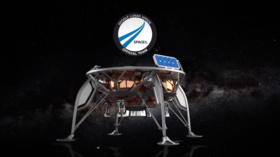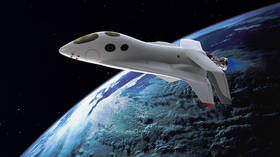Israel aims to join space superpowers club with $100mn privately-funded Moon probe

Israel is looking to join the ranks of space superpowers by becoming the fourth country to land a probe on the Moon. In addition to science instruments, the ‘Genesis’ probe will carry a copy of the Bible on a small metal disc.
Genesis, or “Beresheet” in Hebrew, is about the size of a washing machine and is equipped with instruments for measuring the Moon’s magnetic field. It was designed by SpaceIL, a private company, in cooperation with the state-owned Israel Aerospace Industries (IAI).
#IsraelToTheMoon Infographic 🚀 Incredible work @GNgraphicnews, you "eclipse it"! ha pic.twitter.com/UzwYiwccnV
— Israel To The Moon (@TeamSpaceIL) February 10, 2019
The probe is scheduled to launch on Thursday on board a SpaceX Falcon 9 rocket. It will take it almost two months to reach the moon, however, as it needs to slingshot around the Earth at least six times, SpaceIL CEO Ido Anteby and IAI manager Ophir Doron told reporters on Monday.
SpaceIL was founded in 2011 to compete for Google’s Lunar Xprize, a $20 million challenge to build a robotic probe and land it on the Moon. The competition was canceled last year. The costs of “Genesis” have ballooned to around $100 million, which has been funded through generous contributions from donors around the world who would like to see the Jewish state join the ranks of spacefaring nations.
Watch now 📸 To this day only 3 countries landed on the #moon. Now Israel's journey begins ➡ #IsraelToTheMoon@ILAerospaceIAIpic.twitter.com/jhxosVnhwK
— Israel To The Moon (@TeamSpaceIL) February 12, 2019
“Every Jew, not only every Israeli, will remember where he was when Israel landed on the Moon,” AP quoted South African-born Israeli billionaire Morris Kahn, one of the major donors to the project.
So far, only the Soviet Union, the US and China have landed spacecraft on the earth’s natural satellite. The first Soviet probe landed in 1959, and the first lunar rover visited in 1970. The American Apollo 11 landed on the Moon in 1969, but the Apollo program was canceled at the end of 1972.
China launched its first lunar orbiter in 2007, landed a probe in 2013, and landed a probe on the far side of the Moon in December. In addition to sending photos from the “Dark Side,” the probe boasted the first-ever biological experiment on the lunar surface, growing a cotton seed in an experimental biosphere.
Also on rt.com Meet you on the dark side of the moon: China launches historic lunar exploration mission (VIDEO)Much of the original space race had a Cold War dimension of US-Soviet competition. The feeling of national prestige is very much evident in the Israeli program as well, with the country’s president excitedly tweeting about the impending launch.
SpaceIL is also using the moonshot to troll the country’s designated archenemy Iran, commenting how it can’t hear Tehran’s threats from all the way up on the lunar surface.
Today, @JZarif spoke at the Munich Security Conference about war with Israel. Sorry pal, you'll have to speak louder… #IsraelToTheMoon#MSC2019pic.twitter.com/fVIeDDAn6r
— Israel To The Moon (@TeamSpaceIL) February 17, 2019
Iran has its own space program, which has successfully launched a number of satellites into orbit, but has not reached for the Moon just yet. Moreover, the country’s space efforts have been beset by suspicious failures recently. Anonymous US officials told the New York Times last week that the US has been conducting a program of sabotage against Iran’s missile and space program.
Think your friends would be interested? Share this story!














